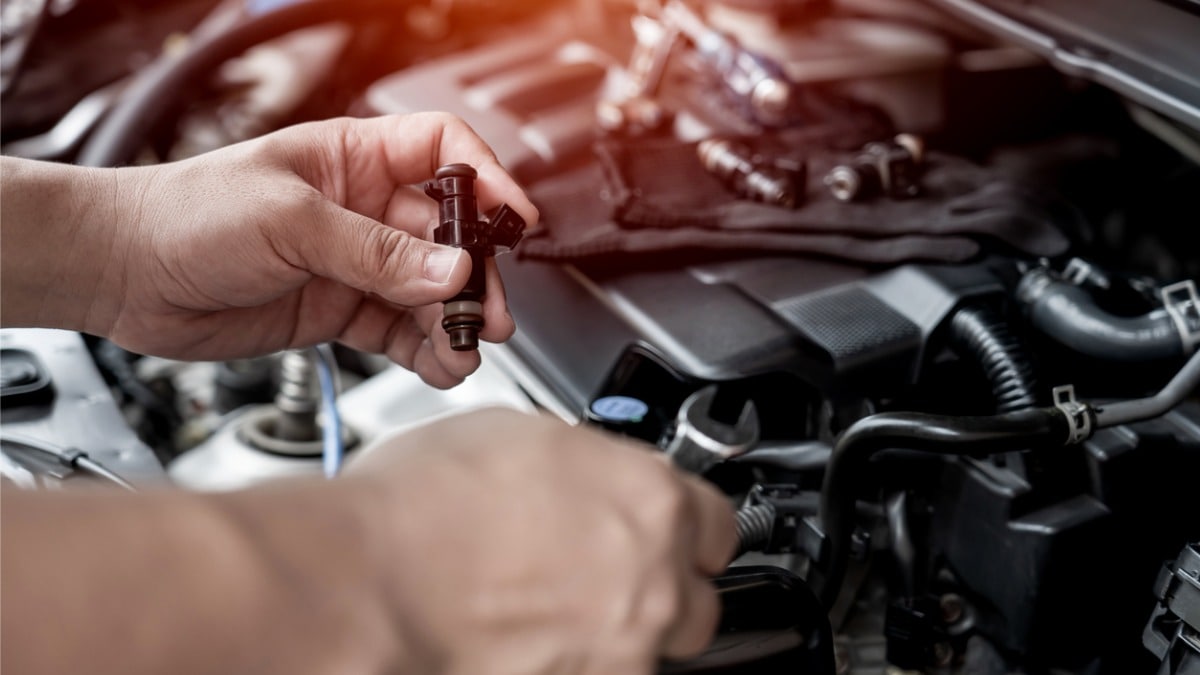- Better-engineered fuel injectors and modern fuel technology with cleaning additives have nearly eliminated the need for flushing fuel injectors.
- Fuel injection replaced carburetors as the engine’s fuel delivery system about 30 years ago.
- Cheap, off-brand gasoline and dirty fuel filters are the enemies of healthy fuel injectors.
Is shelling out the money for fuel-injection cleaning, suggested by some garages and repair shops, a worthy investment in your vehicle? It certainly sounds like it while some mechanic is digging around under your car’s hood, listing potential hazards that may lead to future trouble.
Fuel injection service is part of a larger family of automotive maintenance, including such procedures as flushes for crankcases, power-steering pumps, cooling systems, differentials, and other lubricated parts.
Generally, automakers are engineering mechanical systems that require far less maintenance, not more. That has given rise to 100,000-mile tune-up intervals on many new models, elimination of transmission fluid changes, and far less frequent oil changes. However, the question is, does this leap ahead in technology include fuel injectors? Read on for the answer and a few maintenance tips.
What Are Fuel Injectors?
Fuel injectors are part of the modern delivery system to get gasoline from a car’s tank into an engine cylinder’s combustion chamber. Once upon a time, a carburetor mixed fuel with air which it then fed into the cylinder’s combustion chamber. A spark from the cylinder’s spark plug ignited the fuel-air mixture driving that cylinder’s piston downward. A crankshaft connects the pistons, which, when fired in a series, spin the crankshaft creating the energy that eventually works its way to the drive wheels
Fuel injection has replaced the carburetor in newer passenger vehicles. In simple terms, a fuel injector is an electronically controlled valve. It functions to pressurize gasoline from the fuel pump and air from the intake into a fine mist as it enters the cylinder’s combustion chamber. One or more injectors clogging will reduce the engine’s efficiency and performance even to the point of stalling.
Do You Need a Fuel Injector Flush?
The odds are, your car doesn’t need a fuel injector flush. If it is performing normally and your “check engine” warning light isn’t illuminated, don’t fret over flushing the fuel injectors.
Fuel injection cleaning makes less sense today than it did 30 or more years ago when injection systems fully replaced carburetors. At that time, poorly formulated gasoline and badly designed injector nozzles caused many fouled and plugged injector tips. But that’s far less the case today.
Carmakers have greatly improved fuel injection systems, and most quality gas is formulated with additives that help keep fuel injectors operating at full efficiency. Don’t allow any unscrupulous mechanic to talk you into an expensive flush that your car doesn’t need. If the injectors ever do require flushing, your car will let you know. If you are dead set on a fuel injector flush as a precautionary measure, you can probably wait until the 50,000-to-60,000-mile mark.
See information and find maintenance schedules for your vehicle with repair pricing in your area.
Dirty Fuel Injector Symptoms
Dirty fuel injectors can reveal themselves through various symptoms. Although some of the symptoms we list can be caused by a variety of failures or malfunctions, dirty fuel injectors are certainly among them.
- “Check Engine” warning light illuminates: Any number of issues can cause the check engine light located within the gauge cluster to pop on. Something as innocuous as a loose fuel filler cap to more important issues, such as a failing catalytic converter, can trigger the check engine light. Only a trained professional or, if you are more of a do-it-yourselfer, using an OBD-II scanner to diagnose the problem yourself will expose the exact cause.
- Trouble starting or stalling: If your engine is slow to start or does start and then stalls, the cause may be clogged fuel injectors.
- Sluggish performance: A lack of engine response when goosing the accelerator pedal or if your car’s engine seems to struggle going uphill, the culprit may be dirty fuel injectors.
- Black exhaust smoke: An extreme amount of black exhaust smoke can be traced back to compromised fuel injectors.
- Fluctuating tachometer: If your car’s engine isn’t getting the ideal fuel-air mix, it may react with radically fluctuating RPMs. In other words, if your tachometer needle begins bouncing around when the car is idling, you could have a fuel injector issue.
- Decreasing mpg: A noticeable drop in your car’s fuel economy may be another sign that the fuel injectors are malfunctioning.
- Rough idling: If your car vibrates or shakes when idling, its fuel injectors could be clogged.
- Engine misfiring: Incomplete combustion or misfiring is often caused by fuel injectors not spraying the fuel-air mixture appropriately.
NOTE: If you need your fuel injector flushed, find a mechanic at a repair shop near you.
How to Avoid Dirty Fuel Injectors
You can help ensure your fuel injectors remain healthy and operate at peak capacity by doing two things.
- Avoid cheap gas: Putting off-brand gas in your vehicle may save a few pennies at the pump, but it could cost you big bucks in the long run. Quality fuel will more likely have the additives formulated to help keep your car’s fuel injectors gunk-free and performing up to par.
- Change the fuel filter: A dirty fuel filter can allow contaminants to enter your engine. Each injector has a tiny filter of its own, which can become clogged if the fuel filter fails to trap all potential contaminants. Get pricing on changing your fuel filter.
Our Take
Unless you are experiencing one or more of the dirty fuel injector symptoms listed above, don’t be concerned about flushing the injectors. Buying quality gas and following the maintenance schedule outlined in the owner’s manual should keep the fuel injectors performing at peak efficiency for miles and miles to come, while maintaining your car’s value over time.








